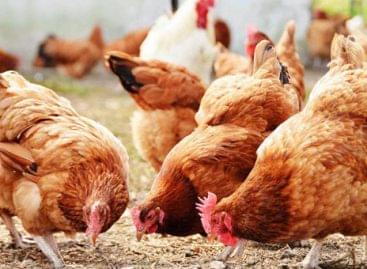Dramatic frost damage hits Hungarian fruit production – A paradigm shift is needed
The year 2025 will go down in history as one of the most serious crises in Hungarian fruit production. Dr. Ferenc Apáti, president of FruitVeB – Hungarian Fruit and Vegetable Interprofessional Organization and Product Council, gave a situation report on Kossuth Radio, in which he drew attention to more severe frost damage than ever before. According to him, the extent of the current damage recalls the largest losses of the past half century and raises serious questions about the future sustainability of fruit production.

(Photo: Pixabay)
The spring weather of the year was particularly cruel to Hungarian fruit orchards. According to the constantly incoming producer reports and professional estimates, two-thirds, or even three-quarters, of the entire Hungarian fruit crop may have been lost. The greatest destruction was suffered by apricot, peach and cherry crops. For these fruit species, a yield loss of 80–90% is expected, which means that there will be hardly any domestic harvest of these varieties this year. The situation is particularly serious in the case of apricots. While the national yield ranges between 20-30 thousand tons in an average year, 6-7 thousand tons were produced even in the weak vintages of recent years. However, this year, according to estimates, only 2-4 thousand tons of apricots can be harvested. The loss is similar in the case of peaches: instead of the usual 20-40 thousand tons, experts expect barely 5-8 thousand tons.
Climate change – no longer just a theory
According to Dr. Ferenc Apáti, based on the experiences of the past 10–15 years, it is clear that fruit growers are feeling the effects of climate change every day. Not only has this phenomenon arrived, but – as he put it – “it has kicked in the door”. Three decades ago, neither frost damage, nor hail, nor droughts caused as much trouble as we experience today. Meteorological science also supports the experience. Global warming is slowing down the polar vortex surrounding the North Pole, which normally keeps cold air masses in the north. As a result, these cold air masses flow down more often between March and May all the way to the Mediterranean region, so not only Hungary, but also Turkey and Spain are affected by serious frost damage – as happened in the spring of 2025. Can Hungarian fruit production be sustained? The sustainability of fruit production is emerging as an increasingly serious issue. The fruit sector has already suffered significant loss of area and yield in the past decade and a half, and it is feared that crop years like the current one will only accelerate this decline. Technological options for protection against weather damage do exist – ice nets, rain protection films, various frost protection systems – but their cost is now many times the investment value of the plantations. In some cases, weather protection increases costs by 3-4 times, while even the most modern technologies cannot prevent certain frosts. The frosts of April 7-8, 2025 were also like this: no matter how they tried to protect the plantations, the extremely strong cooling caused inevitable damage.
Many producers may give up without compensation
Due to the magnitude of the financial losses, state and sectoral assistance is essential. There are currently two damage mitigation mechanisms in operation in Hungary, to which damage can be reported until May 31. At the same time, Dr. Ferenc Apáti emphasized: we are facing such severe frost damage that no damage mitigation fund can be prepared for. The annual value of fruit production in our country is close to 120 billion forints, but this year’s damages could reach 80 billion forints. Meanwhile, commercial insurers – due to the enormous risks – practically no longer offer frost damage insurance. The biggest danger now is that some farmers will lose all their income, while the plantations will have to continue to be looked after – as this is the only way to ensure next year’s harvest. Repaying loans, complying with tender obligations, and retaining the workforce are all factors that require liquidity. The vulnerability of producers is therefore extraordinary.
A paradigm shift is needed
According to the president of FruitVeB, the sector can no longer be operated according to the old schemes. A paradigm shift is needed: new types of production technologies, insurance systems and economic models must be developed in order for Hungarian fruit production to survive. At the same time, the key question is how to preserve the unique value of the excellent taste of the fruits of the Carpathian Basin. In order to preserve these traditional values, complex, long-term solutions will be needed – at the economic, technological and regulatory levels.
FruitVeb
Related news
Poultry meat imports fell in 2025
🎧 Hallgasd a cikket: Lejátszás Szünet Folytatás Leállítás Nyelv: Auto…
Read more >AM: Ministry of Agriculture supports the replacement of plantations damaged by frost
🎧 Hallgasd a cikket: Lejátszás Szünet Folytatás Leállítás Nyelv: Auto…
Read more >Related news
How Coca-Cola plans to build more billion-dollar brands
🎧 Hallgasd a cikket: Lejátszás Szünet Folytatás Leállítás Nyelv: Auto…
Read more >Tesco sets out store expansion plans in 2026 including five former Amazon Fresh sites
🎧 Hallgasd a cikket: Lejátszás Szünet Folytatás Leállítás Nyelv: Auto…
Read more >Brits Embrace At‑Home Celebrations While Germans Cut Back on Valentine’s Day Spending
🎧 Hallgasd a cikket: Lejátszás Szünet Folytatás Leállítás Nyelv: Auto…
Read more >









